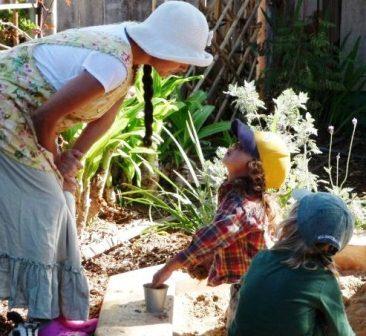My 3 older daughters asked me if they could make some lemonade. I gave them a thumbs-up and they enthusiastically went about setting up their work area and gathering what they needed.
They spent a happy time taking turns squeezing lemons and limes, adding water and sugar and tasting their lemonade. Finally, it was ready. They had used so many lemons that they needed two pitchers for their lemonade. I told them they could put one pitcher in the refrigerator for use the next day and they could leave the other pitcher on the table for use at dinner that night. As my 10 year-old was cleaning off the table, she accidentally knocked the pitcher over, spilling all the lemonade on the table and the floor. She cried, “Oh no! I spilled it!” She had such a look of total disappointment on her face. What happened next was interesting. Neither she nor her sisters asked if they could still have lemonade with dinner. They had decided earlier that the lemonade in the refrigerator was for later, and they were sticking to that. When had they learned to handle disappointment so gracefully?
Disappointment is an unavoidable part of life. It happens to our own children and those in our care far more often than we’d like for them. Instinctively we want to protect them from ever experiencing disappointments, but this is not possible. What we can do for them however, is to teach them how to handle disappointment in a positive way. We can honor and validate their feelings, and comfort them when they experience disappointment. If possible, we can offer an alternative, for example if a much- anticipated trip to the zoo is rained out, we can plan to take the trip on a different day that promises better weather. It is most helpful if the alternative is sure to happen and can be arranged right away; it is not helpful if, for example, in trying to reschedule a play date, you end up having to wait for a call back from the friend’s parents, thus prolonging, for the child, the feeling of being disappointed.
Another strategy I’ve found helpful in working with the children is not only allowing them the space to be sorrowful, but also allowing them the space to move away from the disappointment. I might offer to read a book with the child, ask if s/he would like to assist me in some work I need to do, or if s/he would like to do a project with me. Distraction is a wonderful tool to use with young children. The child soon forgets what had made him/her so sad and immerses him/herself in a new activity. In this way, the children learn to look forward to a better time.
Rhoda Kambandu is a KinderHouse Teacher in Milwaukee, Wisconsin. The original article appeared in the LifeWays Milwaukee Newsletter, and can be found here: http://lifewaysmilwaukee.blogspot.com/2011/09/learning-from-disappointment-by-rhoda.html
If you work or live with the LifeWays principles, you could be a guest writer on our blog. Please write to faith@joyfultoddlers.com if you are interested.
